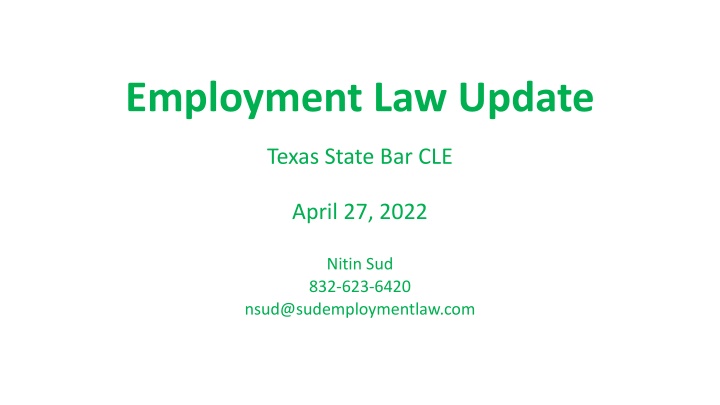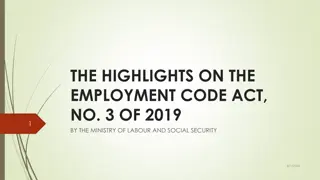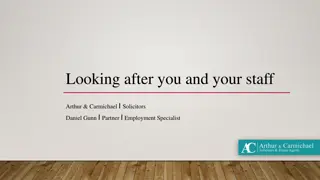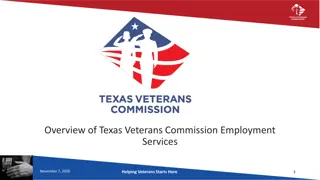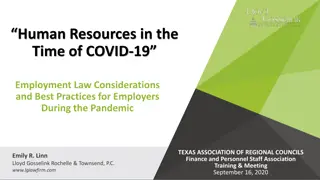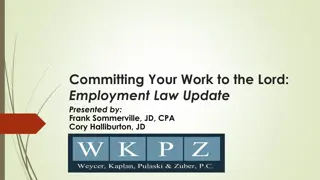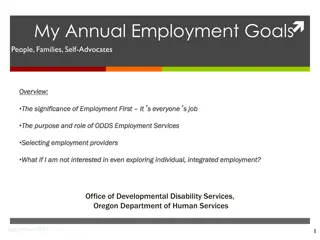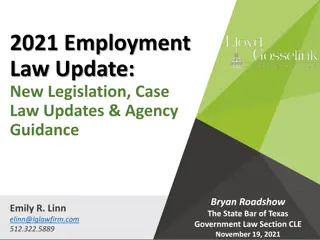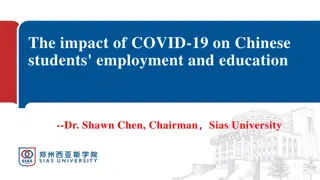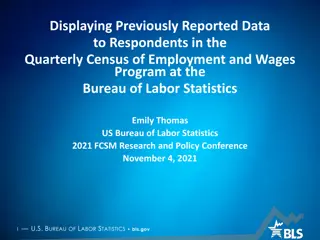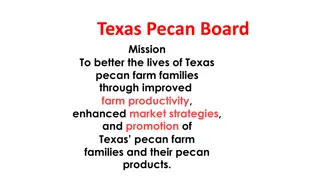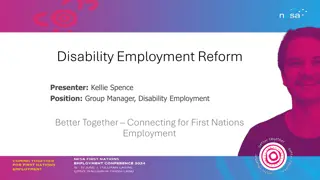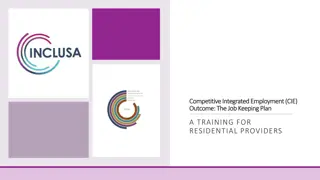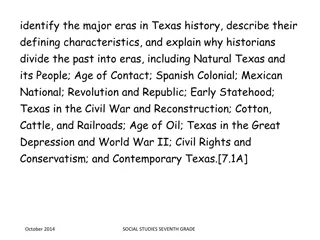Texas Employment Law Update: Key Changes and Implications
The Texas Employment Law has been updated, specifically focusing on the expansion of Chapter 21 of the Texas Labor Code regarding sexual harassment. The update includes increased protections for complaints related to sexual harassment, an extension of the statute of limitations for filing charges, and an expanded definition of employer responsibilities. The defined sections address sexual harassment scenarios and unlawful employment practices. The impact of these changes affects small businesses, supervisors, co-workers, and potential liabilities. Stay informed to navigate these legal matters effectively.
Download Presentation

Please find below an Image/Link to download the presentation.
The content on the website is provided AS IS for your information and personal use only. It may not be sold, licensed, or shared on other websites without obtaining consent from the author.If you encounter any issues during the download, it is possible that the publisher has removed the file from their server.
You are allowed to download the files provided on this website for personal or commercial use, subject to the condition that they are used lawfully. All files are the property of their respective owners.
The content on the website is provided AS IS for your information and personal use only. It may not be sold, licensed, or shared on other websites without obtaining consent from the author.
E N D
Presentation Transcript
Employment Law Update Texas State Bar CLE April 27, 2022 Nitin Sud 832-623-6420 nsud@sudemploymentlaw.com
TOPICS TOPICS Expansion of Ch. 21 of the Texas Labor Code regarding sexual harassment COVID and disability in employment Fair Labor Standards Act two updates Recent jury verdicts in employment discrimination or retaliation cases
Expansion of Ch. 21 of the Texas Labor Code Effective September 1, 2021 Increases protections for complaints made on the basis of sexual harassment Statute of limitations to file TWC charge extended to 300 days (only for sexual harassment claims), instead of 180 days Section 21.201(g) Definition of employer expanded (only for sexual harassment claims) Employs one or more employees; or Acts directly in the interests of an employer in relation to an employee Section 21.141(1)
Sexual harassment defined Section 21.141(2) An unwelcome sexual advance, a request for a sexual favor, or any other verbal or physical conduct of a sexual nature if: (A) submission to the advance, request, or conduct is made a term or condition of an individual's employment, either explicitly or implicitly; (B) submission to or rejection of the advance, request, or conduct by an individual is used as the basis for a decision affecting the individual's employment; (C) the advance, request, or conduct has the purpose or effect of unreasonably interfering with an individual's work performance; or (D) the advance, request, or conduct has the purpose or effect of creating an intimidating, hostile, or offensive working environment.
Unlawful employment practice Section 21.142 An employer commits an unlawful employment practice if sexual harassment of an employee occurs and the employer or the employer's agents or supervisors: (1)know or should have known that the conduct constituting sexual harassment was occurring; and (2) fail to take immediate and appropriate corrective action
Impact Nearly all small businesses covered Individual supervisors/co-workers can be personally liable More likely to defeat diversity jurisdiction Cover actions of independent contractors other non-employees? Acts directly in the interests of an employer in relation to an employee Definition of sexual harassment broader Employers previously could avoid liability by taking prompt remedial action Now must take immediate and appropriate corrective action 300 days v. 180 days to file TWC charge
COVID and disability in employment Americans with Disabilities Act and Texas Labor Code EEOC guidance: https://www.eeoc.gov/coronavirus https://www.eeoc.gov/wysk/what-you-should-know-about-covid-19-and- ada-rehabilitation-act-and-other-eeo-laws
Disability physical or mental impairment that substantially limits one or more major life activity. Includes an actual disability, a record of such an impairment, and those who are regarded as having such an impairment. Is COVID considered a disability ? If an employee has COVID, must the employer provide reasonable accommodations? Working remotely? Can an employer fire an employee for getting COVID? Direct threat defense? Can an employer fire an employee for refusing to get the vaccine?
Sambrano v. United Airlines, Inc. 2022 U.S. App. LEXIS 4347 (5th Cir. Feb. 17, 2022) Decision by Elrod and Oldham; dissent by Smith United Airlines required employees to get COVID vaccine (Aug. Sept. 2021), with limited exemptions based on religion or disability. But could validate religious conviction (is it a sincerely held belief?) Plaintiffs placed on unpaid leave if they do not get the vaccine and meet one of the exemptions File Title VII religious and disability discrimination; seeks injunction District court denies injunction, but Fifth Circuit determines that plaintiffs would suffer irreparable harm because they are forced to chose to contravene their religious convictions or lose pay
Fair Labor Standards Act Exempt or non-exempt from overtime Common exempt positions (i.e. administrative, executive, professional) require a salary of at least $684/week ($35,568/year) plus compliance with specific duties. Highly compensated employee - $107,432/year, paid on a salary basis, and primary duty includes performing office or non-manual work; and one of the exempt duties/responsibilities of an administrative, executive, or professional Reminder Paralegals are non-exempt employees. Must be paid on an hourly rate basis, track and keep records of their time worked, and pay 1.5x for overtime
Hewitt v. Helix Energy 15 F.4th 289 (5th Cir. 2021) Plaintiff was a tool pusher (managing employees) working on an offshore oil rig, working about a month at a time. Paid a daily rate of $963; worked over 40 hours per week, but not paid an overtime rate b/c employer considered him a highly compensated employee exempt from OT pay Regulations (29 C.F.R. 541.601 and 541.604(b)) require $684/week paid on a salary basis, which requires a guarantee of the minimum weekly amount. Fifth Circuit rules, in (12-6) en banc decision that Plaintiff was misclassified and owed overtime pay
Helix does not comply with either prong of 541.604(b). First, it pays Hewitt a daily rate without offering a minimum weekly required amount paid regardless of the number of hours, days or shifts worked. 29 C.F.R. 541.604(b). Helix theorizes that Hewitt's daily rate is the minimum weekly guaranteed amount. But a daily rate, by definition, is paid with regard to and not regardless of the number of . . . days . . . worked. Id. Second, Helix does not comply with the reasonable-relationship test. Helix pays Hewitt orders of magnitude greater than the minimum weekly guaranteed amount theorized by Helix (Hewitt's daily rate). Tellingly, Helix does not contend that it satisfies the reasonable-relationship test. Supreme Court petition filed; distributed for conference on 4/22/2022
DOL Final Rule regarding Tipped Employees Effective December 28, 2021 Background Employers can take a tip credit for employees who work in a tipped profession (servers, bartenders, valet, bellhops, etc.), paying them less than minimum wage. Notice must be provided to employees stating the following: Wage rate that will be paid (i.e. $2.13/hour) The amount of the tip-credit (i.e. $5.12/hour) Employee is entitled to retain all tips received except in a valid tip pooling arrangement Tip credit will not be applied to any employee who has not been informed of these requirements If combined total of wages plus tips is less than minimum wage, employer must make up the difference
https://www.federalregister.gov/documents/2021/10/29/2021-23446/tip- regulations-under-the-fair-labor-standards-act-flsa-partial-withdrawal 80/20 rule Employees must spend at least 80% of their work time performing tip-producing work. The remaining 20% of their work time can be spent on non-tipped duties that are directly supporting tip-producing work, but not more than 30 continuous minutes. No time can be spent on work not part of the tipped occupation. Must pay at least minimum wage for this time. Employers are required to track time spent on the different duties Lawsuit filed by Restaurant Law Center and the Texas Restaurant Association against the DOL in W.D. Texas. Preliminary injunction denied (by Judge Pittman) on Feb. 22, 2022; appeal filed on March 1, 2022.
Recent jury verdicts Recent jury verdicts employment discrimination or retaliation cases employment discrimination or retaliation cases (excludes attorneys fees and costs) (excludes attorneys fees and costs) February 18, 2022 Yarbrough, et. al. v. Glow Networks (Eastern District of Texas, Sherman Division) race discrimination $70 million verdict for 10 plaintiffs ($7 million each $3 million in mental anguish damages; $4 million in punitive damages); no economic/backpay damages sought March 2, 2022 Miller v. TABC (Western District of Texas, Austin Division) retaliation $250,000 verdict for mental anguish damages. March 4, 2022 Oden v. Wellfirst Technologies (Southern District of Texas, Corpus Christi Division) disability discrimination $750,000 total verdict ($200,000 in mental anguish damages; $450,000 in punitive damages; $100,000 in lost income). March 4, 2022 Daniel v. Boxer Property Management Co. (Cause No. 342-32023920, Tarrant County) age discrimination and retaliation $87,000 in back pay, and $32,000 in compensatory damages, and $250,000 in punitive damages. March 11, 2022 Nikolova v. UT Austin, (Western District of Texas, Austin Division) sex and pregnancy discrimination $3 million in emotional distress and $50,000 in back pay. March 15, 2022 Mott v. Tesmec USA, Inc., (Cause No. 17-304893-18, Tarrant County) age discrimination and retaliation $1.1 million (includes $800,000 in punitive damages). March 30, 2022 Carter v. California Grill (Western District of Texas, Austin Division) race discrimination and retaliation $150,000 verdict ($60,000 in mental anguish damages; $90,000 in punitive damages)
